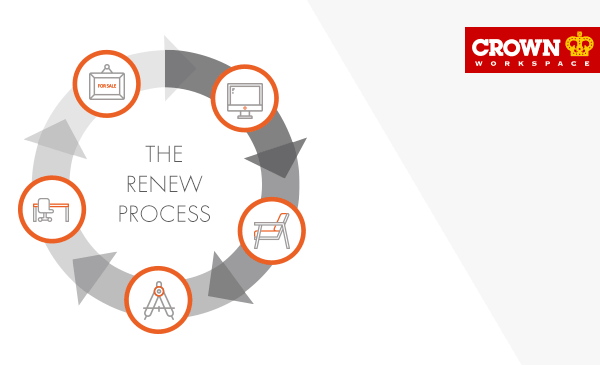Sustainability is at the forefront of almost all industries making it increasingly important that businesses understand how this agenda fits into the workplace and this is where the circular economy can play a part.
Whilst many organisations may have started looking at reducing energy consumption or switching to renewable sources, businesses must start to focus on their procurement activities and how they manage the resources in their organisations. The phrase ‘circular economy’ describes an alternative model to a linear business structure in which things are created, used for a short period and then thrown away. The circular economy offers an opportunity to transition economic activity away from the consumption of finite resources and towards a system that designs out waste and keeps products and materials in use for longer. Implementing circularity in a workplace can contribute to a business’ targets to improve environmental performance.
Making sustainable difference in the workplace
Adopting internal circular principles will only make a significant difference if you ensure that your suppliers embrace sustainability and circularity too. By mapping out clear ethical codes based on circular principles, it is much easier to communicate your expectations.

Selections could be made based not only on price and quality but also environmental impact, prioritising products made from recycled materials, leasing products for temporary use, procuring locally sourced food or implementing packaging returns policies can all make a difference. Adjusting everyday operations to introduce the concept of a circular office can also create quick wins. This can be achieved by removing single use plastics, specifying refillables for cleaning and catering products and optimising recycling opportunities and waste management.
Renovation and refurbishment of office furniture and IT offers an opportunity to transform an office into a circular environment. At Crown Workspace, our award-winning renew centre is the UK’s leading facility dedicated to remanufacturing, refurbishing and repairing office furniture and IT equipment. In 2021, we processed over 27,000 pieces of IT and refurbished 19,000 items of furniture in our Renew Centre. The total carbon saving of both furniture and IT reconditioning in 2021 was 2650 CO2e (tonnes), which would be enough to power 334 homes for a whole year. Our 2022 figures have so far already exceeded this, showing continual growth and development. Rather than throwing out office furniture if it’s damaged, doesn’t fit or the style is wrong, refurbishment is a low cost circular option or rather then buying new look for sustainable refurbished items, they can be of a higher quality then an equivalent new piece.
The motivations for adopting a circular economy business model get stronger every day. Natural resources are finite and cannot be relied upon indefinitely. It’s easy to think we can leave our governing powers to change the tide, but in fact, to have any chance of turning things around, every individual needs to change their mindset. It is important to make sure that everyone in a company is working towards the same end-goal. Rewarding employees for their contributions to circularity can prevent the rejection of new processes where years of consistent practice have been changed.
The bottom line is, if we want to have a world to do business in tomorrow, we need to change the way we do business today.